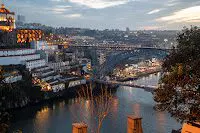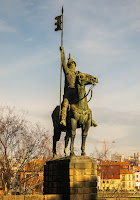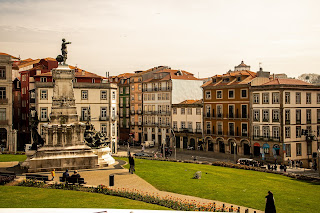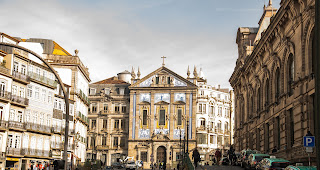I suppose one adventure of Travel is making connecting flights at various airports. The ideal is to board a plane at your home airport and fly nonstop to your destination. That’s highly unlikely if you’re flying overseas in Economy class. I like to think it adds to the adventure of seeing fresh places, even if it is an airport.
For my wife and I on our journey to Portugal, we flew out of Blue Grass Airport in Lexington, Ky., to O’Hare International in Chicago, then a long flight to Zurich Airport in Switzerland (we can now say we’ve been to Switzerland), and then on to Porto Airport in Portugal. Enough about airports.
As I’ve probably mentioned in previous posts, we take guided tours on our trips to Europe because we like someone holding our hands and leading us to various sundry places. Well, it’s not quite that bad because we do like the free time to explore on our own, but a director gives us ideas and can point us in the right direction. And she is someone we can contact if we get totally lost!
 |
| The Douro River at twilight |
Porto, or Oporto to the Portuguese and probably a few others, is a picturesque city on the northwest coast. It’s the second-largest city in Portugal, with a metro population of 1.7 million people.
Porto is a historic city, much like most European places visited by Americans. We began with a walking tour of the Ribeira District, which borders the Douro riverfront. It’s a UNESCO World Heritage Site.
 |
| Porto Cathedral |
Our first stop was the Porto Cathedral, overlooking the Douro River. Construction on the Romanesque structure began in 1110 and was completed in 1737, a mere 627 years. An impressive pillory stands on the grounds. A statue of Vimara Peres, a ninth-century nobleman, stands near the entrance.
 |
| Vimara Peres |
We took a short walk from the cathedral to the Sao Bento Railway Station, which is noted for its tiled mosaics depicting the history of Portugal in the main hall. The predominately blue-and-white tiles are an important part of the nation’s history and culture that you’ll see in other parts of the country. The display on the station’s walls is captivating by the artistry and detail.
Without going on and on, here are a few other highlights from our tour of Porto that including bus stops along the Atlantic coastline and a leisurely boat ride on the Douro River.
 |
| Statue of Prince Henry the Navigator |
 |
| A church with a blue-and-white tile facade |
 |
| Restaurants in the historic Ribeira District |
 |
| Boats on the Douro River |
 |
| Barrel in a warehouse containing Porto wine |
We also visited the Stock Exchange or Bolsa Palace, viewed marvelous wood carvings in the Church of the Convent of St. Francis, and toured Ferreira wine cellars and took part in a tasting of its delightful product.
There was so much to see and do in Porto but so little time as we had to move on to our next stops in Coimbra and Evora. If ever I return to Portugal, Porto is a city where I want to spend a lot of time.
Until the next time . . .
Notifications